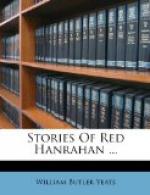When he got to his cabin there was no one there, and he went and lay down on the bed for a while as he was used to do when he wanted to make a poem or a praise or a curse. And it was not long he was in making it this time, for the power of the curse-making bards was upon him. And when he had made it he searched his mind how he could send it out over the whole countryside.
Some of the scholars began coming in then, to see if there would be any school that day, and Hanrahan rose up and sat on the bench by the hearth, and they all stood around him.
They thought he would bring out the Virgil or the Mass book or the primer, but instead of that he held up the little branch of hawthorn he had in his hand yet. ‘Children,’ he said, ’this is a new lesson I have for you to-day.
’You yourselves and the beautiful people of the world are like this blossom, and old age is the wind that comes and blows the blossom away. And I have made a curse upon old age and upon the old men, and listen now while I give it out to you.’ And this is what he said—
The poet, Owen Hanrahan, under a
bush of may
Calls down a curse on his own head
because it withers grey;
Then on the speckled eagle cock
of Ballygawley Hill,
Because it is the oldest thing that
knows of cark and ill;
And on the yew that has been green
from the times out of mind
By the Steep Place of the Strangers
and the Gap of the Wind;
And on the great grey pike that
broods in Castle Dargan Lake
Having in his long body a many a
hook and ache;
Then curses he old Paddy Bruen of
the Well of Bride
Because no hair is on his head and
drowsiness inside.
Then Paddy’s neighbour, Peter
Hart, and Michael Gill, his friend,
Because their wandering histories
are never at an end.
And then old Shemus Cullinan, shepherd
of the Green Lands
Because he holds two crutches between
his crooked hands;
Then calls a curse from the dark
North upon old Paddy Doe,
Who plans to lay his withering head
upon a breast of snow,
Who plans to wreck a singing voice
and break a merry heart,
He bids a curse hang over him till
breath and body part;
But he calls down a blessing on
the blossom of the may,
Because it comes in beauty, and
in beauty blows away.
He said it over to the children verse by verse till all of them could say a part of it, and some that were the quickest could say the whole of it.
‘That will do for to-day,’ he said then. ’And what you have to do now is to go out and sing that song for a while, to the tune of the Green Bunch of Rushes, to everyone you meet, and to the old men themselves.’
‘I will do that,’ said one of the little lads; ’I know old Paddy Doe well. Last Saint John’s Eve we dropped a mouse down his chimney, but this is better than a mouse.’




